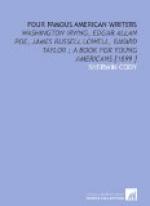Already he was a poet, with all a poet’s aspirations and eagerness. A year before he left the academy his first printed poem appeared in the Saturday Evening Post of Philadelphia. It is not wonderful as poetry. Yet we read it with interest, because it shows so plainly the earnest and ambitious, yet cheerful, nature of the boy. He did not merely sit and hope; he was determined to win his way. It is entitled, “Soliloquy of a Young Poet.”
A dream!—a fleeting
dream!
Childhood has passed, with all its joy
and song,
And my life’s frail bark on youth’s
impetuous stream
Is swiftly borne along.
High hopes spring up within;
Hopes of the future—thoughts
of glory—fame,
Which prompt my mind to toil, and bid
me win
That dream—a deathless
name.
* * * * *
I know it all is vain,
That earthly honors ever must decay,
That all the laurels bought by toil and
pain
Must pass with earth away.
But still my spirit high,
Longing for fame won by the immortal mind—
On fancy’s pinion fain would scale
the sky,
And leave dull earth behind.
Yes, I would write my name
With the star’s burning ray on heaven’s
broad scroll,
That I might still the restless thirst
for fame
Which fills my soul.
Bayard Taylor was not a great genius, and he did not succeed in winning quite all of that high fame for which he struggled throughout his life. He never expected to have earth’s blessings showered upon him without working for them; and the fact that he failed somewhat in his highest ambition—to be a far-famed poet—makes his life seem nearer to our own. We call him a great man because he did well what came to him to do, working hard all his life. In this we can all follow his example.
CHAPTER IV
SELF-EDUCATION AND AMBITION
“The Village Record” (to the proprietor of which Bayard was apprenticed) was printed upon an old-fashioned hand press, and it was the business of the apprentices to set the type, help make up the paper, pull the forms, and send the weekly issues off to the subscribers.
The mechanical work was soon learned, and the young apprentice found considerable time for reading. He now began that work of self-education which he carried on through his whole life. Already, before he left the academy, he had become acquainted with the works of Charles Dickens, and had secured the great man’s autograph. “I went to the Academy,” says he, “where I received a letter that had come on Saturday. It was from Hartford; I knew instantly it was from Dickens. It was double, and sealed neatly with a seal bearing the initials C.D. In the inside was a sheet of satin notepaper, on which was written, ’Faithfully yours, Charles Dickens, City Hotel, Hartford, Feb.




